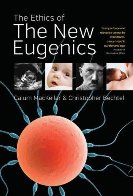Reviewed by D. Joy Riley
“Am I a eugenicist?” That question rose to my consciousness repeatedly as I read Calum MacKellar and Christopher Bechtel’s well-researched volume on the “new eugenics.” The answer to that question relies, at least in part of course, on which definition one uses. Shortly before his death in 1911, Francis Galton, founder of the Eugenics Laboratory of the University of London, defined eugenics as “the study of the conditions of human control which improve or impair the inborn characteristics of the race” (p. 17). MacKellar and Bechtel proffer a broader definition; namely, “all strategies aimed at affecting or deciding the genetic heritage of a child, a community or humanity in general are eugenic procedures” (p. 9).
The history of eugenics is not a pretty one, certainly, but it is the correct place to begin. An understanding of the cultural milieu in which the concern for health morphed into an obsession for the well-being of the species, with the attendant enforcement of state-sponsored sterilizations among other intrusive programs, is essential for our time. It forms a backdrop as well as a shaky foundation for consideration of what is currently on offer in terms of shaping succeeding generations. While some commentators see the term eugenics as applying only to a particular time and state-sponsored coercion, the editors of The Ethics of the New Eugenics examine the eugenic roots and tendrils of a panoply of procedures and tests offered to reproductive-age men and women.
Relying upon the UN’s Universal Declaration of Human Rights, the editors contrast the acceptance of children “born free and equal in dignity and rights” (Article I; p. 98) with the lack of acceptance by society of children born with a preventable disorder or disability. Prenatal genetic diagnosis, preimplantation embryonic selection, sex selection, egg or sperm selection, termination of pregnancy, savior siblings, adoption, reproductive cloning, and infanticide are included, inter alia, as potentially eugenic means available to would-be parents. Parental choice in these matters does not negate the reality of a pervasive eugenics in our midst.
Several aspects of the book deserve mention. The language is clear, and the arguments — both for and against the new eugenics — accurately presented. Pertinent legislation at various levels is succinctly offered; included are the UN, the Council of Europe, as well as national laws of the United Kingdom, the United States, and Germany. The chapters are replete with notes.
Editors MacKellar and Bechtel aimed to accomplish two tasks with this book:
- To introduce the “selection procedures that constitute the new eugenics”
- To “stimulate and galvanize discussion in the public square” (pp. 10-11).
They have done an excellent job of the first task, and have certainly made provision for the second. The book will raise some unsettling questions in the reader’s mind. “Am I a eugenicist?” will be joined by, “Am I welcoming to other human beings — whatever their age or ability — who share this planet we call home?” Answering those questions will contribute to the humility we need for the public square. In providing the impetus for such questioning through their thoughtful analysis, Calum MacKellar and Christopher Bechtel have done us all a favor.
D. Joy Riley, M.D., M.A. (Bioethics) is executive director of The Tennessee Center for Bioethics & Culture and serves on the ethics committee of a Nashville-area hospital. Board-certified in internal medicine, her writing and lecture topics include medical ethics, organ transplantation ethics, stem cell research, genetics, and assisted reproductive technologies. With Scott B. Rae, she co-authored Outside the Womb: Moral Guidance for Assisted Reproduction (Moody, 2011).
Buy the books

The Ethics Of The New Eugenics